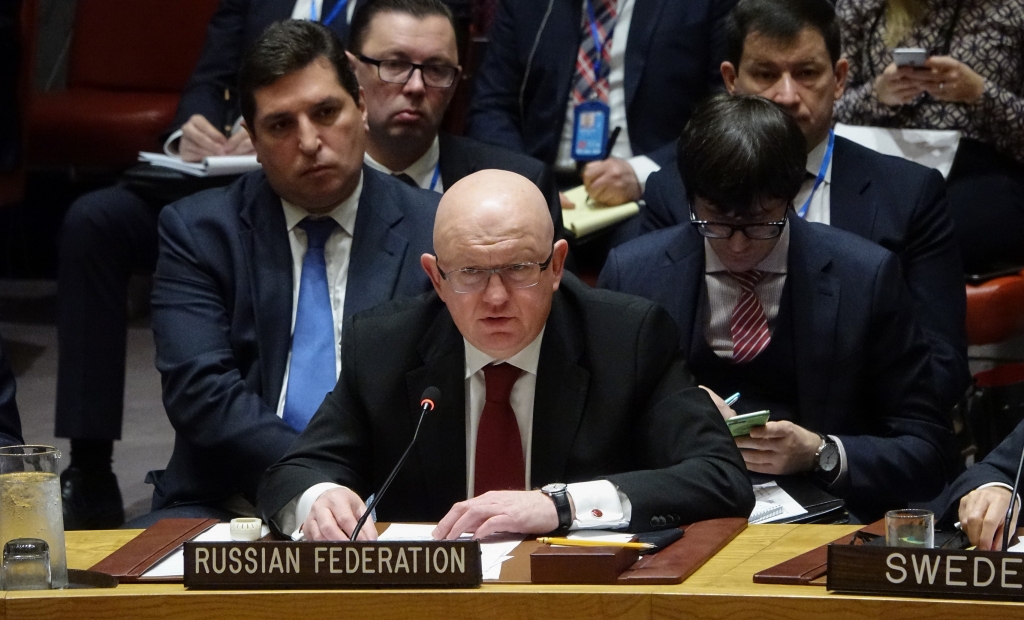Statement by Ambassador Vassily A. Nebenzia, Permanent Representative of the Russian Federation to the United Nations, at the Security Council meeting on the Middle East, including the Palestinian question
I would first like to express our appreciation to you, Sir, as President of the Security Council, to my colleagues on the Council and to everyone in this Chamber today for the tribute to the memory of Vitaly Ivanovich Churkin, the late Permanent Representative of Russia, exactly a year since he was unexpectedly and untimely taken from us. I thank you.
I would also like to express our sorrow and sympathy at the passing yesterday of our dear friend and colleague Mr. Necton Mhura, Permanent Representative of Malawi.
We are pleased to welcome Mr. Mahmoud Abbas, President of the State of Palestine, to the Council Chamber.
We believe that the participation of the leader of Palestine in today’s meeting is important to an understanding of the current situation in the Middle East. We thank Mr. Mladenov for his informative report on the situation regarding the settlement of the Palestinian-Israeli situation.
The long-suffering region of the Middle East is being ripped apart by violent conflicts, in Syria, Yemen and Libya, all of them in themselves deeply critical. But it would be deluded to think that the Palestinian problem has now taken a back seat and an even greater mistake to put it there on purpose. Even today it is still the epicentre of the chronic instability in the Middle East.
The situation in the area has recently deteriorated. In the absence of full-fledged political negotiations between the Palestinians and Israelis, the notorious recent decisions regarding Jerusalem have not only inflamed emotions and pushed the situation into another destabilizing cycle, they have intensified people’s desperation.
There have been demonstrations in the West Bank and Gaza and angry statements from the Palestinian leadership and the capitals of the ArabMuslim world, all of which only confirm the sensitive significance of the problem of Jerusalem, the cradle of three monotheistic religions. We believe that increasing the pace of Israeli settlement activity will undermine the prospects for achieving a two-State solution and that the policy should be ended.
Ensuring the ability of the United Nations Relief and Works Agency for Palestine Refugees in the Near East to do its work effectively is absolutely critical. We must never let the Palestinians find themselves in circumstances where they have nothing to lose, practically speaking, a situation that would fuel radicalism and has the potential to blow up the situation in the Palestinian territories and the entire region.
Russia contributes regularly to the Agency’s budget as well as giving the Palestinians bilateral assistance. It bears repeating that the current status quo in this protracted conflict is incapable of producing a reliable, lasting and viable outcome. Only a settlement based on a two-State formula, presupposing the peaceful and secure coexistence of two States, Palestine and Israel, will enable the crisis to be overcome and create the conditions for sustainable development and a road to peace. As the situation evolves, Russia will continue its efforts to maintain the architecture of the Middle East settlement and to lead the political process out of its current depressed state.
The priority task right now is achieving an immediate resumption of direct Palestinian-Israeli negotiations on a generally recognized international legal basis, including the relevant Security Council resolutions and the Arab Peace Initiative. We firmly believe that the Middle East Quartet still has the full potential to be a unique mediation format, approved by the Council’s resolutions. There should be no question that the group of four mediators, in collaboration with the League of Arab States, is capable of playing a role in unfreezing the political dialogue.
The work of the Quartet, particularly its report of June 2016, has not lost its relevance. Implementing the report’s recommendations will help to strengthen confidence-building measures between the parties. It discusses what to do about the settlement activity, the persistent provocative rhetoric and violence from both sides and other factors, as well as the imperative of ensuring that the Palestinians achieve genuine national unity based on the political platform of the Palestine Liberation Organization.
We support activating this mechanism and its regular and thorough collaboration with the League of Arab States and all the regional and global stakeholders that are capable of helping to overcome the dangerous impasse in the PalestinianIsraeli settlement. We particularly welcome Egypt and Jordan’s efforts in that regard. Our Egyptian partners’ mission to unite the Palestinians’ ranks continues to be vital. Getting new developments with regard to the Palestinian-Israeli conflict requires considering how the international community will support the process so as to create the conditions for direct negotiations between Palestine and Israel. A direct dialogue on settling all final-status issues is a given in the Middle East peace process equation. We must focus on developing a formula acceptable to both sides.
We are ready to discuss its parameters with all global and regional stakeholders. As we all know, the last two weeks in Russia have seen numerous contacts conducted at the highest level, including visits by King Abdullah II of Jordan, Prime Minister Benjamin Netanyahu and President Abbas. We reaffirm our willingness to provide a platform in Russia for a meeting of Palestinian and Israeli leaders, without preconditions. We expect the proposal will receive a positive response from both sides.
We would like to emphasize that achieving a Palestinian-Israeli settlement, as with the resolution of other regional problems, will require joint efforts and collective and mutually respectful cooperation. All efforts to lay blame, groundless accusations and insulting rhetoric must be left behind, forever part of the past.
We must rather activate channels for dialogue where we can discuss ways for resolving these difficult problems. The measures for confidence-building and security for the entire Middle East that we have long proposed still remain on the agenda.
